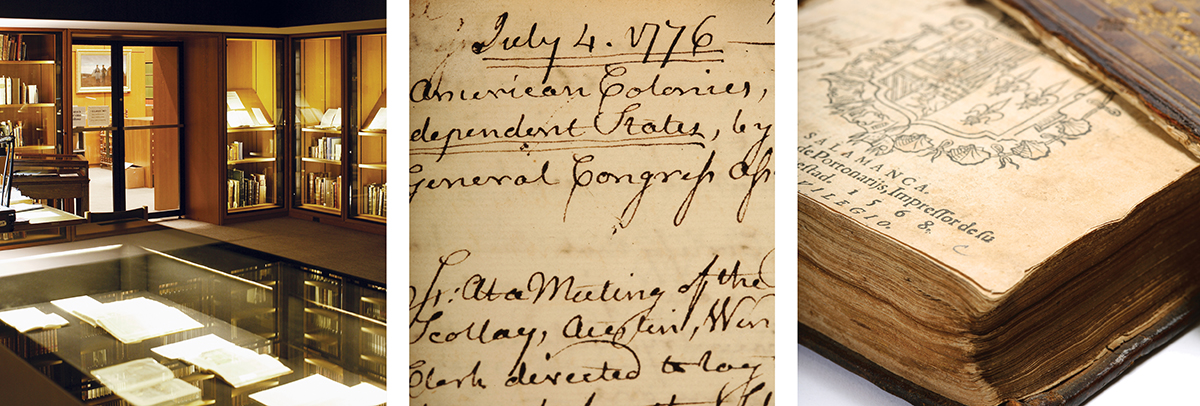The Race to Save the Rare Books
When the library’s Copley Square building opened in 1895, founding elders and wealthy Brahmins gave their money and their books. But their benevolence has created a huge challenge for their successors. Flush with good intentions, those early patrons never thought about having to survey, clean, and eventually repair their donated volumes. Decades later, the gargantuan task of upkeep is a responsibility the city is struggling with. “We’re not doing a very good job,” says Walker.
The outgoing library president agrees. “In some ways, we’re cursed by having so much,” Margolis told me recently. After Mayor Tom Menino orchestrated his ouster in November, Margolis accused him of being “anti-intellectual” and of putting the library’s treasures in danger. That enmity hasn’t dulled. “It’s a lot to maintain, and sometimes we’ve needed leadership that understands that investing in this resource as a public good produces a direct economic return. But we haven’t had the blessing of that.”
Given the library’s limited resources, deciding which books to target for restoration is a scattershot process. “We’ve been forced to move from a proactive model, where we identify and treat important collections, to a reactive model, where our work is essentially need-driven on an item-by-item level,” Walker says. Sometimes he’s alerted when a patron requests an old book. The volume emerges from a century of slumber in the stacks, flops open, and falls apart; Walker adds it to his pile. But he tries not to contemplate the thousands of books that cry out for his attention. It’s too disheartening. He focuses instead on simple satisfactions of the work. “I like to take things apart and put them back together,” he says. It’s good that he’s enthusiastic, considering how little help he has and how important his work is, not just to the city, but also to the cultural heritage of the nation.

A book awaiting Walker’s attention. (Photograph by Christopher Churchill)
To save a book, you must first take it apart. It’s not a sight a book lover wants to see. “There is nothing more violent and upsetting,” says Prindle, than watching Walker unbind a volume.
For a hardcover book, like the Priestley, whose covers will be replaced, Walker clutches the pages in one hand, as though grabbing a chicken by the neck, and simply pulls the cover off. He wants to expose the backing, the place where the glue holds it all together. The adhesive must go, not only because it’s in the way, but also because it’s eating the paper. Walker applies a poultice of methyl cellulose to the exposed backing. The compound breaks down the glue, leaving a gooey muck he then scrapes off with a dull knife.
Next, he separates the pages into their gatherings, the four-sheet bundles of paper that compose the meat of the book. He cuts the ancient linen threads that hold the gatherings together, then lays flat the individual sheets to be washed. For a book like the Priestley, whose pages are made of linen, the culprits Walker needs to wash away are the acidic animal glues as well as the gelatinous compounds that were spread over the paper to fill its pores. In younger books—meaning those less than 200 years old or so—the acid he battles is left over from the papermaking process itself. Around 1800, manufacturers started making paper from wood pulp, which involves using acids to break down the cellulose fibers in the source timber. The thing about acid is, it never quits. Walker says lots of books printed between 1800 and about 1970 are cooking away in the stacks. Some even smell burnt.
Before he bathes the Priestley’s pages, Walker has to consider the chemical properties of the ink used for the marginalia. In Adams’s day, people often made their own ink, relying on recipes that seem equal parts witchcraft and household chemistry. Two centuries later, the variations in the quality and acidity of these concoctions can surprise even an experienced conservator. Walker has never lost any marginalia, but he did once put a printed sheet of paper into a water bath and watched everything “just lift off the page.” Sentences disintegrated, words came apart, letters went floating about like alphabet soup.
To test the ink Adams used to write his notes, Walker places a drop of deionized water onto one of the president’s bits of marginalia. (“This sentence is a string of sophisms,” Adams had noted to himself.) The ink doesn’t break apart. Next, the scarier part: seeing whether it will withstand total immersion. He puts the page into a mesh-screen holder; once wet, it will become even more fragile. Then, with a steady hand, he sets the holder in the water tray. Walker likes to say that at this point he puts his faith in God and chemistry. He’s well aware of the consequences, should either one fail him.
When the sheet hits the water, it dampens at the margins and along the strip that once met the spine—the spots on the page that are most covered in glue or most exposed to the air and the corrosive atmospheric particles that have been around since the dawn of the Industrial Revolution.
With the water gathering on the paper, Walker watches the sheet closely. “You always worry,” he says. “Did Adams decide that this would be the page where he experimented with some new ink?” The sheet seems to hesitate. Then something happens. One of the handwritten notes begins to attract water. “Don’t see that too often,” says Walker, with the kind of detached calm that you hope never to hear from a doctor who’s examining a funny growth on your leg.
But the ink holds fast. After a moment, Walker relaxes. “That’s probably where Adams opened a fresh bottle of ink. Probably a slight change in acidity.”
Slowly, the sheet surrenders to its fate and sinks. The air fills with a nutty odor as the glue (made from horses’ hooves) and the gelatinous compounds break down, turning the water yellow. But the words of John Adams stay right where they are. God and chemistry have done it again.
Before he’s finished, Walker will replace the water twice, rinsing the sheet three times. Later he will “paint” the pages with an alcohol solution called sizing that restores the stiffness, or as he calls it, the “crackle.” After he has done all that a hundred times or so for the 450-page book, he will resew the gatherings, rebuilding the book with needle and thread. The whole project should take about 35 hours. But for Walker it’ll end up requiring two weeks. Because of personnel cuts, his work is interrupted by other tasks—like supervising the rare books reading room while other staffers are at lunch.

From left, the rare books reading room; the minutes from a Boston selectmen’s meeting on Independence Day; a 16th-century volume from the collection of the Holy Roman Emperor. (photographs by Christopher Churchill)
No one—not Susan Glover, the acting head of the rare books department; not Beth Prindle; not Stuart Walker himself—can be sure of what will happen when lame-duck director Bernard Margolis leaves his post in June. A search is now under way for a replacement, one who will no doubt, by mayoral dictate, be expected to pay more attention to the library’s branch locations. That means the task of bolstering Walker’s efforts is likely to continue to fall to a cadre of private library devotees. David McCullough, the Pulitzer Prize–winning biographer of John Adams, is one such booster. “I take pride in the fact that the BPL is one of the five greatest libraries in America,” he says. “You have the Library of Congress, the New York Public Library, Harvard, Yale, and the BPL, the only one that’s truly public.” But, he adds, “time is destroying who we are in that library every day.” A former library trustee, McCullough has partnered with the Associates of the Boston Public Library in a fundraising effort that has so far collected nearly a million dollars. He’s also “adopted” a book, contributing $4,000 for the restoration of John Adams’s boyhood volume of Cicero, a project Walker has recently begun.
On the open market, says McCullough, such a book could fetch a quarter of a million dollars. He’s not alone in fearing that figures like that might tempt cash-strapped bureaucrats to plan a used book sale: On occasion, Margolis says, city officials have asked him, “Why don’t you sell something?” In effect, get a windfall for some of the most valuable books and then use the money to restore the rest. But Margolis feels that all of the BPL’s rare books were gifts to the public. “We owe an allegiance to those donors, and if we want to attract additional donors, we must show that we will be good stewards of donated material,” he says.
Still, the staggering size of such an effort has even supporters like McCullough talking about a backup plan. Though it would be far better, he says, “to find some generous person who wants to give the money to keep them all in Boston,” the author has floated the idea that the BPL donate the Adams collection to a national institution, like the Library of Congress, if the money to conserve it here can’t be raised. You don’t sell your treasures, but you may have to sacrifice them to protect them, just as the city of Quincy did when it handed over the president’s books to the BPL a century ago. While the notion has few fans in Copley Square, to McCullough, it’s a realistic last resort. In the meantime, Walker is due to get a little added help in the form of donated funds for an intern and a new conservation study. It’s not much, but it’s a start.
One afternoon, Stuart Walker sits in the half-light of the rare books reading room. Nearby, a student is exploring some distant corner of the human story. Walker looks down at an ancient ledger and considers his work. “You take something that’s dead and bring it back to life,” he says. “It’s a great occupation.” Still, the fight for staffing, money, and public support is taking its toll on his department. “People like us are crazy enough to be devoted to this place. But God, it gets exhausting.”